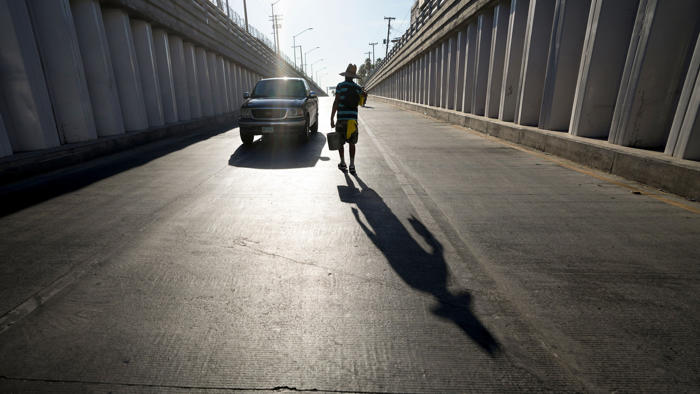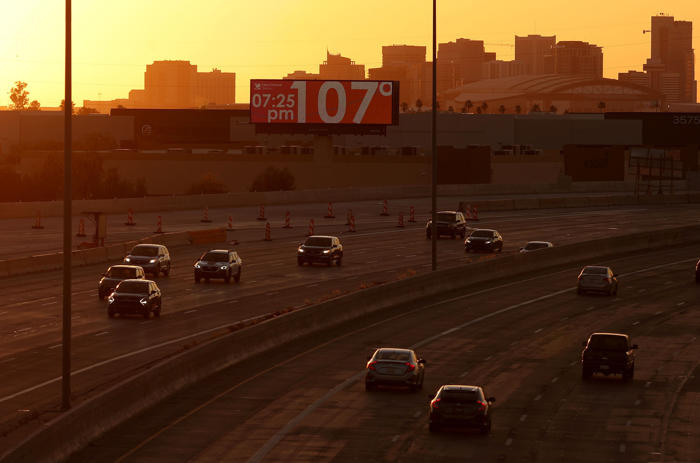Climate change is multiplying the probability of deadly heat waves in the US and Central America

In Mexicali – a city in Baja California, Mexico – a window washer approaches a car, which is waiting to cross the border into California.
Over the past two months, Mexico has experienced one of the most extreme heat waves ever recorded. At the end of May, in the municipality of Cunduacán — in the north of the state of Tabasco — more than 150 howler monkeys died, apparently because they couldn’t adapt to the high temperatures. At the national level, since March 2024, at least 125 deaths due to heat and 2,308 cases of heat stroke have been reported. In the Yucatán Peninsula, in southern Mexico, a record maximum temperature of 125°F was reached on June 13.
The situation wasn’t very different in neighboring countries. There were monthly records set for high temperatures in Guatemala and annual temperatures in Honduras. On the other hand, in the southwest of the United States, “more than 34 million people live in areas where authorities have issued heat alerts and dozens have suffered heat exhaustion at political rallies,” explains a recent analysis carried out by the World Weather Attribution (WWA). This academic project also warns that, due to climate change caused by human activities, these deadly heat waves are 35 times more likely to occur in North and Central America.
In a press conference, Dr. Friederike Otto of the WWA explained that the mission of this group of scientists is to answer — as quickly as possible — a question that arises during an extreme climate event: what role did climate change play?
Looking at the recent heat wave that was experienced across this region, everything indicates that climate change played a significant role. If the climate crisis increased the probability of heat waves occurring by 35 times during the day, for night temperatures, it’s even greater, with the analysis showing a 200-fold increase in probability due to global warming.

A father and his son cool off in the fountain at the Monument to the Mexican Revolution, in Mexico City, on April 16, 2024.
To reach this conclusion, the team — which includes researchers from Mexico, Panama, the Netherlands, the United Kingdom, the United States and Sweden — examined the five days with the maximum temperatures (day and night) that the region experienced during May and June. They ran a model to find out how this behavior could be influenced by climate change.
During that five-day period, maximum temperatures were, on average, 1.4°C higher during the day and 1.6°C higher at night. “However, we must remember that this is the average for the North and Central American region: in some areas of Mexico, there were even more unusual heat records, in which climate change led to up to 2°C more,” clarifies Izidine Pinto, a researcher at the Royal Netherlands Meteorological Institute and one of the co-authors of the study. Although the study hasn’t yet been peer-reviewed, it used methodology that has been.
Based on the conclusions, it can be said that we’re at the height of a crisis. In 2000, such extreme heat in the region was expected to occur during the months of May and June once every 60 years. That is, a person would only have to face this scenario once in their lifetime. But, with the global warming that has been recorded, it is estimated that these temperatures will be repeated once every 15 years. This means that a person will experience hot, deadly high temperatures five to six times in their life.

An electronic billboard shows the temperature above 100 degrees in Phoenix, Arizona, on June 5, 2024.
Central America isn’t prepared
The region’s extreme heat was fueled by several factors, scientists say. “The area has been lying under a large and lingering region of high pressure, known as a heat dome,” the document states. Added to this is the fact that Mexico, for example, was experiencing a drought that didn’t allow moisture in its soil. This generated what’s known as a feedback loop, i.e. the heat worsens drought, which in turn worsens the heat. On top of this, both the Pacific and the Atlantic oceans recorded surface temperatures above average, resulting in increasing humidity and increasing discomfort that adds to the already excessive temperatures.
But what made the situation fatal is that there are no policies, adaptation plans or preparations to deal with these temperatures. “In Mexico and Central America, there’s no governance in the face of heat waves, nor the ability to adapt the electrical systems, which were strongly affected,” laments Karina Izquierdo, urban advisor for the Latin American and Caribbean region of the Red Cross Red Crescent Climate Center.
Among the things that are pending, for example, is to protect vulnerable populations — such as newborns and those over 60 years of age — who tend to be more susceptible to heat. There’s also a need for policies to support mobile and rural workers when they face high temperatures. “In the short-term, school and work schedules could be adapted to avoid heat waves,” Izquierdo added.
The most disturbing thing, however, is seeing how the heat becomes deadly. Although so far 125 deaths have been recorded in Mexico, it’s likely that there are many more fatalities — and not only in this country, but throughout North and Central America. Deaths due to heat aren’t always reported as such, while there are often no records that highlight the problem. The heat — especially when it’s exacerbated by climate change — is leading to a public health crisis.
“Extreme heat increases rates of cardiovascular, respiratory and kidney disease and threatens the stability of our electrical grid, impacting communities and healthcare facilities,” explains Dr. Catharina Giudice, MD, who wasn’t involved in the analysis conducted by the WWA. “We’ve broken heat records year after year. This concerns me deeply as an emergency physician.”
Sign up for our weekly newsletter to get more English-language news coverage from EL PAÍS USA Edition
